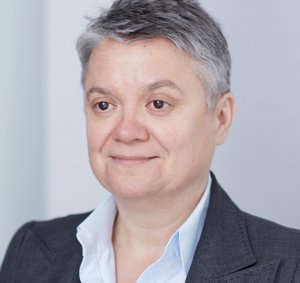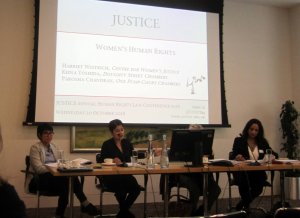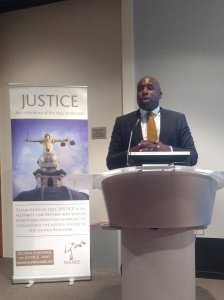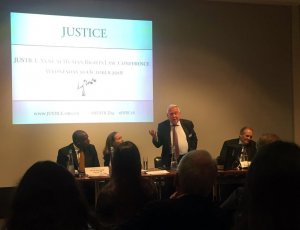On Wednesday 10 October our annual Human Rights Law Conference took place at Freshfields Bruckhaus Deringer, with over 130 people attending. This year, we hosted discussions on a number of topics including access to justice, climate change, national security, Brexit and modern day slavery.
The conference opened with a fascinating Morning Keynote Address, delivered by Justice of the Supreme Court, Lord Carnwath of Notting Hill. His topic was an exploration of ‘Human Rights and the Environment’.

Lord Carnwath recited the historical development of a right to a healthy environment, as it has received recognition in jurisdictions throughout the world, including an insightful review of how such rights have been protected under ECHR case law. He noted with enthusiasm that there had been a shift in recent years towards acknowledging environmental rights as an end in themselves, quite apart from the risk to individual human beings. The Inter-American Court’s Columbia Advisory Opinion, as well as The Global Pact for the Environment were cited as two significant developments in this regard.
Lord Carnwath then finished with an inspiring yet cautionary note on the real threat of climate change, and lamented the behavior of the current United States administration for threatening to eradicate the judicial protection afforded to the environment in the case of Massachusetts v Environment Protection Agency in 2007. A report that the attorney-generals for fifteen states, led by New York and California, are suing the US Environmental Protection Agency for violating the Clean Air Act as an area of development which should be anticipated with interest.

Karon Monaghan QC gave this year’s Review of the Year, choosing to focus on the theme of gender in the Supreme Court’s judgments in the last year. Before diving into the review she highlighted the fact that two more women have been appointed to the Supreme Court, which has meant that for the first time the court has sat with a majority of women on the bench. There have been a number of cases before the Supreme Court with gender at their heart, notably the Northern Ireland abortion case, which Karon warned feminists to read together with a big glass of wine! Despite finding the Claimant had no standing to bring the case – dismissing the appeal – the Court still chose to consider the substantive arguments. Karon said that this was a very complex case and challenged anyone to find its ratio.
A majority did find that the current law on abortion in Northern Ireland is disproportionate and incompatible with Article 8 for cases of: (a) fatal (as distinct from serious) foetal abnormality (b) pregnancy as a result of rape and (c) pregnancy as a result of incest. As there was no standing, no declaration of incompatibility under the Human Rights Act was made. Karon ended her review by asking whether it was time to think about democratic accountability in the selection process of Supreme Court Justices. Acknowledging that this was not the best time to make this argument, given what has recently happened in the USA, she said that the current secretive appointments process could be improved by a “getting to know you” hearing for nominees, at the least. This would allow the public to learn about the Justices and shine a light on what progress is being made on diversity in the Supreme Court.

The day’s Workshops featured a line-up of impressive speakers on a range of topics. In the morning these were on Criminal Justice and Human Rights, Judicial Review and Women’s Human Rights. The afternoon sessions covered Immigration, Asylum and Human Rights, Privacy, Security and Surveillance and Life, Death and Human Rights.
The afternoon Keynote Address was delivered by The Rt Hon David Lammy MP. In his eighteen years as MP for Tottenham, David has served as a passionate advocate for the rights of vulnerable communities. Trained at Harvard Law School, he has also served as an authoritative voice on issues of justice, last year publishing the Lammy Review: an independent review of the treatment of, and outcomes for, Black, Asian and Minority Ethnic (BAME) individuals in the Criminal Justice System. In a Keynote introduced as a “fireside chat”, David set out to explain: “a year on from the Lammy Review: where are we now?”

From the outset, David cautioned that his address would be more “fire” than “side”, launching into an outspoken critique of the rise of far-right populism – one that he sees as precipitated by the inadequacies of a centrist status quo that failed to predict its own collapse. Brexit, Lammy predicted, will serve to deepen the inequalities exposed by the 2008 crash.
Lammy argued that the vast socio-economic and racial inequalities in the UK feed into every corner of the justice system: “every country”, including the UK, “disproportionately jails minority populations”. Meanwhile, “the independence of the judiciary is becoming a cloak from which to hide from their communities”. In describing the genesis of the Lammy Review, he commended the apparently broad-tent, cross-party approach taken by the Government that commissioned the work. However, he decried how – while appearing willing tackle issues of “race” – Governments have pursued an aggressive, hard-line policy on immigration. It is disproportionately people of colour once again marginalised by this agenda.
What is needed, David argued, is “deep, exciting redistribution”, although he warned that leaving the EU is not a route, as some would have it, to a socialist utopia. And although much can be done to reform the criminal justice system (with work on judicial diversity as a key starting point), inequality can only be truly addressed by tackling its socio-economic roots. The Russel Group universities, David suggested, have a central role to play in reconfiguring society for the better.

The JUSTICE Human Rights Law Conference concluded with the plenary debate session, which featured David Lammy MP (Labour), Bob Neill MP (Conservative), Lord Marks QC (Liberal Democrat) and was chaired by JUSTICE Director Andrea Coomber. Following on from Mr Lammy’s keynote address, Mr Neill and Lord Marks QC both spoke passionately in favour of access to justice and a return to pre-LASPO levels of legal aid funding. Mr Neill spoke of access to justice as fundamental to the rule of law. He said that the Supreme Court in the 2017 case of UNISON had got it “spot on” in holding that exorbitant filing fees for employment tribunal claims were unlawful for frustrating access to justice. Lord Marks QC observed that the savings target for the LASPO cuts had been £450 million annually, but in 2016 the cuts had in fact saved £950 million. Lord Marks told the crowd that the additional £500 million ought to be the starting point for the reinstatement of legal aid. All speakers offered an optimistic tone, hopeful that in coming years, there would be significant clawback from the LASPO cuts.
Thank you to everyone who made this year’s conference possible, particularly the speakers and Freshfields Bruckhaus Deringer for hosting us for another year.
There is more coverage of the conference on Twitter under #JHRC18
The full JUSTICE Human Rights Law Conference programme can be seen here (pdf)
